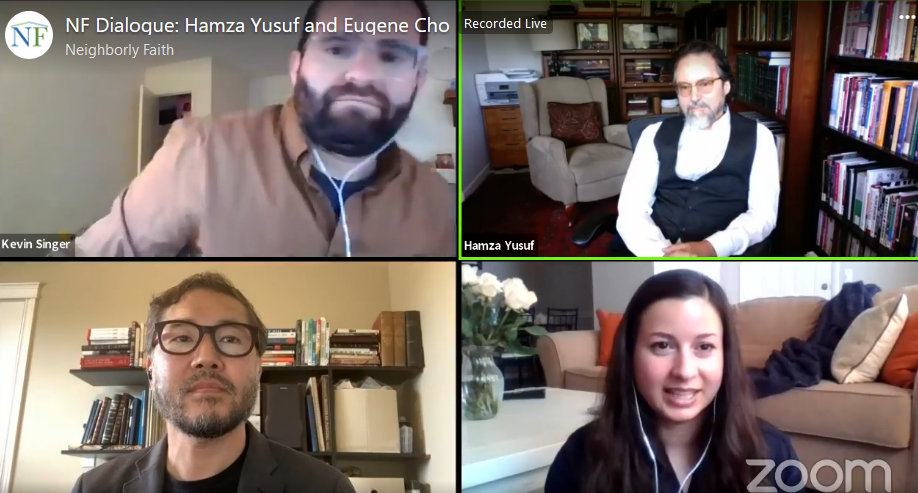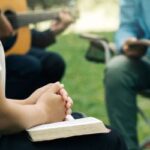We brought evangelicals and Muslims together to discuss the pandemic. Here’s what we learned.
By Kevin Singer and Chris Stackaruk
When we started inviting evangelical and Muslim leaders to discuss their perspectives on COVID-related issues for our Spring webinar series, we knew it would be interesting and hopeful, but we didn’t expect over 115,000 people to tune in.
It turns out, people all over the world are seeing the unique promise of evangelical-Muslim friendship in a complex and fractured world.
By and large, our guests weren’t people who frequent interfaith conversations. Rather, we went out of our way to invite leaders that appeal strongly to people within their own tradition. This is in line with one of our organization’s values: That one doesn’t need to be an expert in interfaith relations or peacebuilding to have robust conversations across differences of belief.
The conversations, which featured pastors, imams, non-profit directors, authors, college leaders, CEO’s, and even fashion bloggers, averaged around one hour and tackled topics ranging from worshipping safely and protecting religious freedom, to self-care and maintaining healthy relationships, caring for one’s church or mosque, battling fear, and disaster relief.
Here are some of lessons we learned:
Evangelicals and Muslims have some of the same concerns. Renowned Muslim scholar Hamza Yusuf of Zaytuna College joined Eugene Cho, President and CEO of Bread for the World, for a conversation about the next chapter of religion and politics in America. “I think that Muslims have a lot in common with the concerns of conservative Christians,” Hamza explained. “We want to see societies that don’t objectify women or men, we want to see societies where children are protected… We are a people committed to the sanctity of marriage… The traditional Muslim stance on abortion is very strong… I think those areas are very important,” he concluded.
Evangelicals and Muslims have deep differences, but also some similar beliefs. Danielle Strickland of the Salvation Army, author of several popular books and founder of several Christian non-profits, engaged in a hope-filled conversation with Yasmin Mogahed, a very popular Muslim influencer. They exchanged thoughts on how their respective beliefs provide comfort during these chaotic and unpredictable times.
“I think in the middle of a crisis, there is a deep invitation. One of the beautiful stories I love is the creative account in Genesis. The Holy Spirit is hovering over the chaos, and then speaking life out of that chaotic place. For me, this is an invitation to not be afraid of what I can’t control but to know that God is with me in this crisis and that he’s waiting to speak life out of that place,” Danielle explained.
Yasmin reflected, “If we see God in a certain way, it will change the way we respond. There’s a concept that we have an Arabic… Which means to always have a positive opinion of God and to realize that God does not want to harm us, but rather that God wants good for us. God is acting in our best interest. The things that happen to us and our lives aren’t happening to us that are happening for us.”
This inspiring sliver of dialogue is just one of the many we were fortunate to hear during the webinar series. In almost every conversation, our guests heartened toward one another and talked optimistically about a shared future for evangelicals and Muslims in America and abroad.
Evangelicals and Muslims love faith and freedom. Reverend Johnnie Moore, a religious freedom advocate who serves as President of the Congress of Christian Leaders, engaged in a livening conversation with Asma Uddin, author of When Islamic is Not a Religion (2019). Together they agreed that the religious freedom of Christians and Muslims in America is deeply intertwined, so both groups have an interest in looking out for each other. “You can’t believe in religious freedom at all unless you believe in religious freedom for all,” Johnnie argued.
Popular writer and scholar Shadi Hamid noted that evangelicals and Muslims have in common a deep respect and love for religion, which provides an anchor in difficult seasons of life. “I’m of the point of view that if there’s ever a time where religion seems more essential, it’s precisely in times like this. Science and rationality fall short when we want to go beyond the scientific analysis and we want to talk about what is ultimately important to us, what gives life meaning,” Shadi explained.
The webinar series came on the heels of Neighborly Faith’s dialogue event with Yaqeen Institute President Omar Suleiman and Southern Baptist Convention President J.D. Greear at North Carolina State University, which drew over 1,200 students and was covered in Religion News Service and Biblical Recorder. (Both Yaqeen and Neighborly Faith are Faith Counts partners.)
Omar reflected on the event in a recent piece for Religion News Service, in which he wrote, “One of the most fruitful dialogues I’ve had in years came in March at North Carolina State University with the Rev. J.D. Greear…Greear and I founded a friendship on our ability to speak faithfully and honestly about our differences, even with a crowd of more than 1,000 looking on,” adding, “Pastor Greear and I also spoke about religious freedom not being restricted to one religious group, without either my or his concept of salvation being compromised or made ambiguous. I was and am fine with his vision of the hereafter not having space for me, so long as it doesn’t become an obstacle to me having space in the here and now.”
In our years of work with Neighborly Faith, we have observed that when evangelicals and Muslims get together, they click, though their faiths are profoundly different sometimes. When it comes to honest and constructive exchanges across deep differences, we believe that these two groups can set the example of hospitality and graciousness for everyday people.
We’re excited to take this vision and these conversations to evangelical colleges over the next two years. To keep up with our work, follow us on Facebook, Twitter, or Instagram.
—
Kevin Singer (@kevinsinger0) is Co-Founder/Director of Neighborly Faith.
Chris Stackaruk is Co-Founder/Director of Neighborly Faith.




